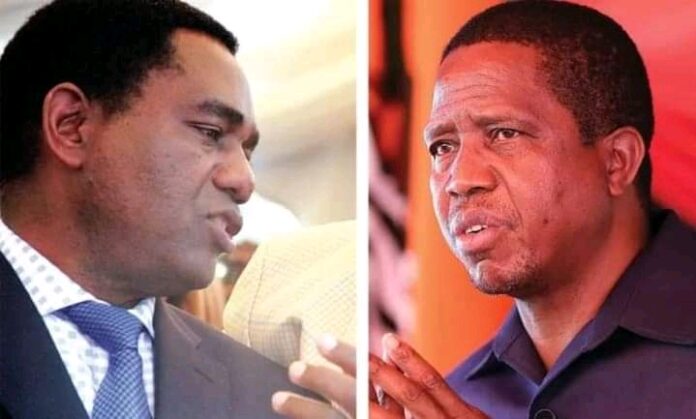2016 Presidential petition was not determined on merit – ELGIA
Electoral Law and Governance Institute of Africa (ELGIA) executive director Felix Owuor says the 2016 presidential election petition in which President Hakainde Hichilema was challenging the election of Edgar Lungu was not determined on merit.
https://www.facebook.com/share/p/gwD3nxddRRDNk74P/?mibextid=oFDknk
He said the Electoral Law Jurisprudence on the Special Effect Doctrine proves to be a challenge.
“The most problematic of them all is the interpretation of the Special Effect Doctrine on the threshold for invalidating an election on the basis of illegalities and irregularities, and whether a credible election should meet. both the qualitative and quantitative test,” Owuor said.
The ELGIA director was speaking during the Launch of the Strategic Plan of the Advisory Committee on Elections Management by the Zambian Judiciary on Wednesday.
He said the move to establish a permanent Committee of the Judiciary to deal with the electoral disputes effectively made Zambia, the second country in the continent with a permanent committee of the Judiciary dedicated to dealing with electoral dispute resolution, after the Kenyan Judiciary Committee on Elections (JCE), established in 2012.
“Currently, there are only 3 countries in Africa (Kenya, Zambia and Malawi with permanent committees embedded in the Judiciary to resolve electoral dispute resolution,” he said.
“The electoral process landscape in Africa still has a number of challenges and uncertainties that the Zambian Judiciary will be invited to help address.”
He cited cases that have not been conclusively settled among them the presidential Petition of 2016 brought by President Hakainde Hichilema and his then vice president Geoffrey Bwalya Mwamba.
“While the Jurisprudence seems settled in Kenya and Malawi in the landmark cases of (Raila Odinga & Another vs IEBC & 2 Others (2017), and the Malawi case of Arthur Peter Mutharika & Another vs Saulos Klaus Chilima & Another), the jurisprudence is yet to be fully developed in a number of African countries including Nigeria (Buhari vs Obasanjo; Atiku Abubakar vs Yaradua), Uganda cases of Kizza Besigye and Amama Mbambazi, Zimbabwe (Chamisa vs Mangagwa) and the Zambian case of (Anderson Mazoka & Others vs Levi Patrick Mwanawasa (2002), among others,” Owuor said.
“Am sure all of you can remember in 2016 the Zambian case the Hakainde Hichilema versus Edgar Lungu was never heard on its merits.”
He said on the standard of proof on election petitions the Judiciaries in Africa seems to be split with Kenya, Zambia and Uganda adopting an intermediate standard of proof, while the majority of jurisdictions have adopted the Malawi Supreme Court; reasoning that the standard of proof in electoral petitions is the civil standard which is on a balance of probabilities.
“In most countries the election dispute resolution (EDR) process is highly prescribed requiring strict application of the Constitution and the election laws. As a result, there are too many litigations in the electoral process,”Owuor said.
“We have full confidence on the ability of the Zambian Judiciary to strengthen the electoral dispute resolution framework in Zambia and to make a constructive contribution to the development of electoral dispute resolution in Africa, which will in turn strengthen the electoral processes in the continent.”
He added that ELGIA reaffirms its commitment to supporting the Zambian Judiciary in this important endeavour as a respectful and dependable ally, by respecting the Zambian laws and political context which must inform the Zambian EDR process.
Speaking at the same event, acting chief justice Micheal Musonda said maintaining an effective and credible electoral processes is crucial for upholding the democratic values essential to any democratic society.
“Elections represent the cornerstone of any democracy and are indispensable to any democratic polity such as ours. Politicians also know too well that democracy is expensive,” he said.
“The Constitutional role of resolving electoral disputes which we perform has a significant bearing on the lowering of the post-election political temperature in our country and the maintenance of peace, stability and
order.”
He said the responsibility of resolving post-election disputes, expeditiously represent a huge source of stress and strain on the Judiciary due to limited resources which are required to execute its role effectively.
“Financial constraints, human resource challenges and infrastructural limitations are just a few of the problems we grapple with.
To make matters worse, every successive election cycle compounds the strain and stress for the Judiciary exponentially,”Justice Musonda said.
“The Judiciary is bound to fall short of attaining that ideal, unless we are supported (in good time) in the way of addressing the factors behind my lamentations.”
Chairperson of the Chief Justice’s Advisory Committee on Election Management (ACEM) judge Mapani Kawimbe said judges should be allowed to decide on political cases without unfair preference.
“We judges should be left to decide cases with adherence of the law with regardless of who is involved,”she said
“Election cases are highly sensitive in nature and exert a lot of pressure on the courts, litigants and citizens. The Judiciary being the ultimate guardian of justice, has a role to play in ensuring electoral disputes are handled highly in an effective manner.”
United Nations Development Program (UNDP) James Wakiaga says the UNDP is expectant that the electoral reforms process that is currently underway will provide clear guidance on key reforms to be implemented both before and after the August 2026 elections.
“UNDP is committed to supporting the Judiciary and other stakeholders to ensure that mechanisms for the efficient disposal of election related disputes are reviewed, updated and aligned with regional and international best practices,”said Wakiaga.
And acting British High Commissioner to Zambia Sam Waldoc aid; “central to credible elections is a comprehensive and effective dispute resolution mechanism, that ensures integrity and fairness of the electoral process.
When electoral grievances are resolved transparently and justly, there is increased public trust in the outcome of elections.”
By Mwaka Ndawa
Kalemba September 27, 2024
